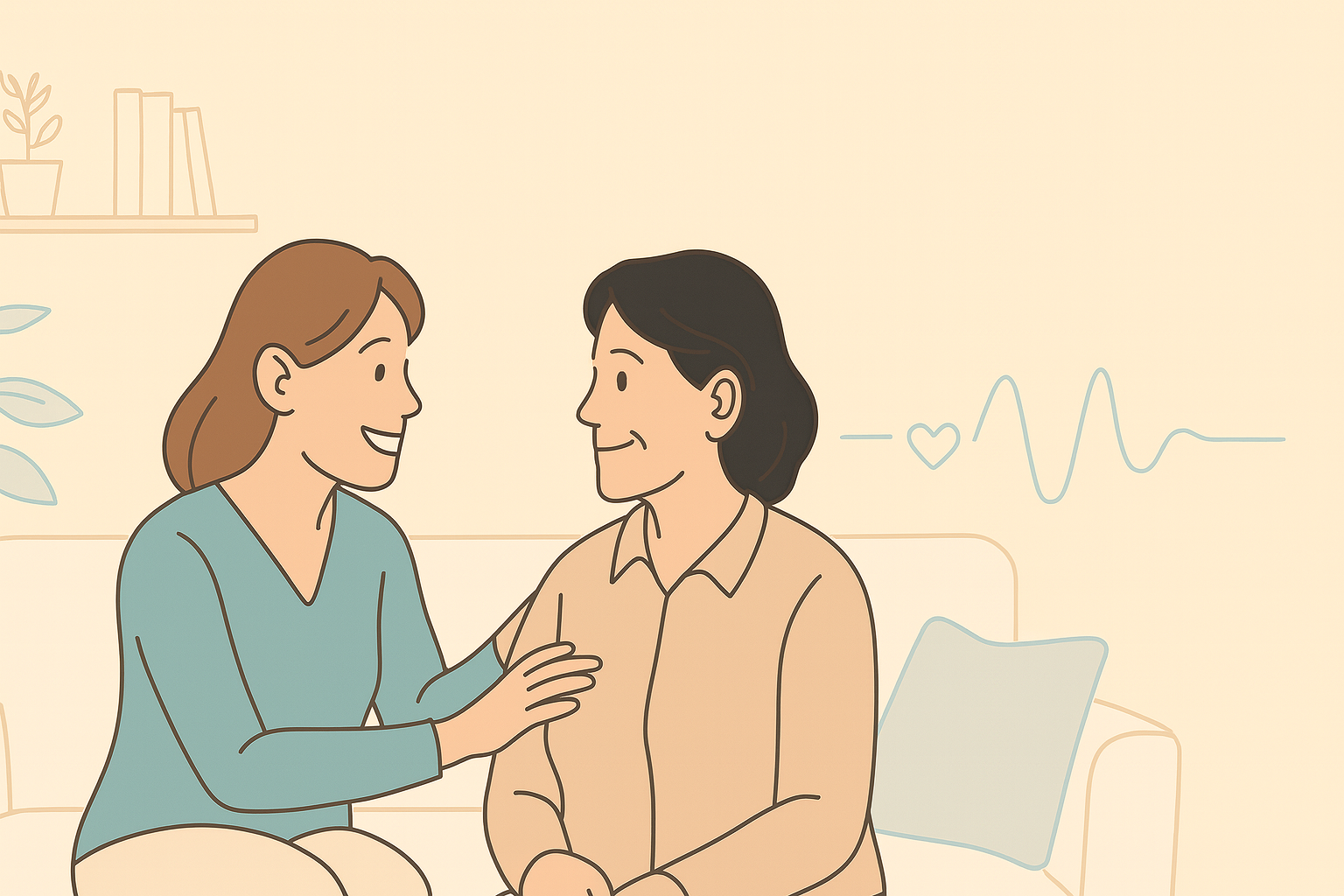
How to Talk to a Loved One About Hearing Loss (Without Conflict)
Have you noticed your father asks you to repeat yourself more often? Or your mother turning up the TV? It can also be your partner avoiding social gatherings because conversations feel overwhelming.
Deep down, you know already that these signs point to hearing loss — but every time you mention hearing aids, they resist.
Talking to someone you love about hearing loss isn’t easy. It’s emotional, delicate, and often met with denial. But the right words, timing, and approach can make a big difference. In this article, we’ll show you how to have that conversation with empathy, how to avoid common mistakes, and how to guide your loved one toward better hearing.
Why Conversations About Hearing Loss Are So Difficult and Why Your Support Is Essential
If your loved one resists, you’re not alone. Millions of families face the same challenge. Here’s why the conversation can be so sensitive:
- Fear of ageing and social stigma: Some worry hearing aids will make them look “different”, while many associate them with getting old. Accepting them feels like admitting decline. Addressing those concerns early can help your loved one take that final step toward hearing well.
- Financial concerns: They may believe hearing aids are too expensive. Luckily, nowadays, between national insurance, private insurance and online providers like Auzen offering attractive prices, there is a hearing solution for every budget.
- Perceived need opposed to actual problem recognition: Often, the person doesn’t realise how much hearing loss impacts their daily life. People are more likely to seek help when everyday communication problems are obvious and acknowledged by loved ones.
- Lack of self-confidence in manipulating tech: The fear of not being able to manage small technological devices and appointments often has a significant influence on moving from “I’ll think about it” to taking action. Supportive coaching and clear, step-by-step resources are invaluable in this scenario.
Understanding these barriers will help you approach the topic with compassion and not frustration.
Spotting the Early Signs of Hearing Loss
Before you start the conversation, make sure the signs you’re noticing are real indicators. Common red flags include:
- Turning the TV or radio up louder than others prefer.
- Asking “What?” or “Can you repeat that?” frequently.
- Struggling to follow conversations in noisy places (restaurants, family dinners).
- Withdrawing from social activities they used to enjoy.
- Complaining that others are “mumbling.”
Preparing Yourself Before Starting THAT Conversation
The way you prepare matters almost as much as what you say.
- Educate yourself first. Learn about hearing loss and modern hearing aids. Did you know many are now almost invisible and connect to smartphones, allowing you to make and take phone calls or stream music? Or connect to the TV? Monitor your health or live-translate? See our Blog.
- Gather concrete and recent examples. Try to note everyday moments where hearing loss created a difficulty (TV watching, family dinner, in the street, etc.) Having specific examples will help your loved one recognise the problem to start with.
- Pick the right moment. Avoid stressful times. Choose a calm, private setting. Try leading with “Could we talk about something I’ve noticed with conversations lately?”
- Lead with empathy, not confrontation. Your goal is support and gentle nudging, not winning an argument.
- Use collaborative, benefit-focused framing. “I miss chatting at family dinners; I’d love to make that easier again. What do you think?”
- Have quick and easy solutions ready. Small steps taken together build momentum and confidence. For example: “You can take a free online hearing test with Auzen to check your hearing. That’s a great first step, it only takes 5 minutes, and we can do it right now together”.
- Offer ongoing support and involvement. Attend the first online appointment together and help create a list of communication goals (e.g., hearing the grandkids, watching TV at a low volume). Clear goals allow for a better visualisation of the progress accomplished.
The Right Way to Talk to Your Loved One About Hearing Loss
The conversation should be respectful, supportive, and ongoing. Here are some strategies:
- Use “I” statements, not blame. Instead of “You never listen,” try: “I’ve noticed it’s sometimes hard for you to hear the grandchildren, and I’d love for you to enjoy those moments fully.”
- Emphasise benefits. Hearing aids are not about weakness — they’re about independence, social connection, and even brain health.
- Be patient. Acceptance often takes time. Think of this as a journey, not a one-off talk.
Common Mistakes to Avoid
Even with good intentions, some approaches can backfire:
- Don’t shame, pressure or criticise. Stigma and perceived loss of control hinder uptake; supportive, autonomy-affirming talk helps. Avoid saying things like “You’re deaf” or “You never listen.”
- Don’t minimise their feelings. If they’re worried about how hearing aids look, acknowledge it rather than brushing it off.
- Don’t push too hard. Pressure often leads to more resistance. Instead, focus on empathy and small steps forward.
- Don’t make it a one-off confrontation. Open the conversation, let the person “digest” the information, and realise the concrete effects on their life. Bring the topic up next time by asking if they have thought about the conversation.
Some more arguments to show How Hearing Aids Can Transform Daily Life
Hearing aids aren’t just devices — they can transform quality of life:
- Improved relationships. Better communication strengthens family bonds.
- Reduced social isolation. They’ll feel confident joining conversations again.
- Better mental health. Hearing aids lower the risks of depression and anxiety.
- Brain protection. Research shows that treating hearing loss helps protect against cognitive decline and dementia.
Where to Get Support and Resources
You don’t have to do this alone. Professional guidance can make the process easier:
- Online audiologists. With Auzen, consultations are 100% online, making it easy and discreet.
- Complete guidance & fittings. Our experts support every step, from first fitting to daily use.
- Maintenance support. Auzen provides maintenance kits to keep devices in top shape.
Encourage your loved one to take the first step. Book a free online consultation with Auzen today and explore the best hearing solutions — from the comfort of home.
Talking to a loved one about hearing loss is never easy. But with patience, empathy, and the right approach, you can help them overcome fear and denial — and embrace a better quality of life.
At Auzen, we believe hearing care should be accessible, supportive, and 100% online. If you’ve noticed signs of hearing loss in someone you love, start the conversation today and let us guide you both on the path to better hearing.
Take the first step. Book your free online consultation with Auzen now.

Leave a comment
This site is protected by hCaptcha and the hCaptcha Privacy Policy and Terms of Service apply.